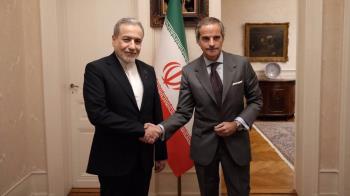Alwaght- China lashed out at the US and the UK for applying double standards to Iran’s nuclear activities and those of their ally Australia.
Speaking at the International Atomic Energy Agency (IAEA)’s Board of Governors meeting in Vienna on Friday, Wang Qun, the Chinese envoy to the UN and other international organizations in Vienna, raised concerns about the Australia-UK-US (AUKUS) agreement for cooperation on Australian acquisition of nuclear-powered submarines.
“Why do the US and UK say Iran can’t enrich uranium above 3.7%, while on the other hand they plan to transfer tons of highly enriched 90% material to AUKUS?” he said. “This is an example of a double standard.”
Wang added that the inclusion of Beijing’s concerns at the IAEA meeting should be the start of a new international process to scrutinize the AUKUS deal, which he described as a “small Anglo-Saxon clique” that could prompt more countries to go nuclear.
In a note circulated earlier among diplomats in Vienna and seen by Bloomberg, Wang warned that the AUKUS agreement “constitutes serious risks of nuclear proliferation.”
The remarks came ahead of the seventh round of the Vienna talks between envoys from Iran and the P4+1 group of countries — Britain, France, Russia, and China plus Germany — aimed at putting the 2015 nuclear accord, called the Joint Comprehensive Plan of Action, back on track.
The negotiations will resume on Monday after a five-month pause over the presidential election and the formation of a new administration in Iran.
Former US president Donald Trump left the JCPOA in May 2018 and re-imposed the anti-Iran sanctions that the deal had lifted. He also placed additional sanctions on Iran under other pretexts not related to the nuclear case as part of his “maximum pressure” campaign.
Following a year of strategic patience, Iran resorted to its legal rights under the JCPOA, which grants a party the right to suspend its contractual commitments in case of non-compliance by other signatories, and let go of some of the restrictions imposed on its nuclear energy program.
The US administration of President Joe Biden has said it is willing to compensate for Trump’s mistake and rejoin the deal, but it has shown an overriding propensity for maintaining some of the sanctions as a tool of pressure.
Tehran insists that all sanctions must first be removed in a verifiable manner before it reverses its remedial measures.
Iran renews call for sanctions removal; US mounts threats
On Saturday, an Iranian negotiating team led by the country’s chief nuclear negotiator, Ali Baqeri-Kani, arrived in Vienna for the new round of the talks.
In an interview ahead of his visit, Baqeri-Kani, who serves as Iran’s Deputy Foreign Minister for Political Affairs, stressed that any progress on a US return to the JCPOA must be preceded by the scrapping of all American sanctions and a guarantee that a future administration in Washington will not renege on the agreement once again.
“The removal of all the Joint Comprehensive Plan of Action (JCPOA)-related sanctions such as the sanctions imposed within the framework of ‘maximum pressure’ campaign is the necessary condition for the success of the negotiations,” he told The Independent.
However, the US special envoy for Iran threatened to further increase pressure on Tehran if it continues its peaceful nuclear program.
“If that’s Iran’s approach, which is to try to use the negotiations as cover for an accelerated nuclear program, and as I say, drag its feet at the nuclear table, we will have to respond in a way that is not our preference,” Robert Malley told BBC Sounds. “Nobody should be surprised if at that point there is increased pressure on Iran.”
Similarly on Thursday, a US statement to the Board of Governors threatened to confront Iran at the IAEA.
“If Iran’s non-cooperation is not immediately remedied ... the Board will have no choice but to reconvene in extraordinary session before the end of this year in order to address the crisis,” the statement read.
Russia: US forgot pressure won’t work with Iran
Russia’s Ambassador to the IAEA Mikhail Ulyanov criticized Washington over the statement.
“I believe that demonstrates that our American counterparts lose patience but I believe all of us need to control our emotions,” he added.
“The US did not negotiate with the Iranians for a very long time and forgot that Iranians don’t do anything under pressure. If they are under pressure, they resist.”



























